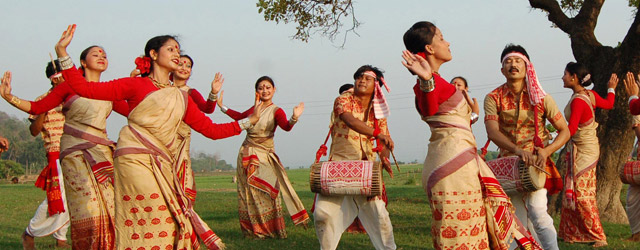There are three types of Bihu’s that are celebrated in Assam, namely Bohag, Magh and Kati Bihu. Among these three Bihu’s, Bohag Bihu claims the top position as the occasion is celebrated with much enthusiasm and fanfare throughout the state. The occasion of Bohag Bihu also coincides with the Assamese New Year, which is another reason behind the grand celebrations. The seven days of Bohag Bihu are known as ‘Chot', 'Kutum', 'Mela' 'Raati', 'Goru', 'Manuh' and 'Chera'.
- Raati Bihu- Raati Bihu celebrations start from the first night of the month of Chaitra and lasts till the commencement of Uruku. Celebrations involve a gathering of the local women in an open field and lighting up the torches. Men folks of the villages play an instrument made from buffalo hornpipe during the occasion.
- Goru Bihu- On the occasion of Goru Bihu, the cattle of the villages is bought to a single water source and thoroughly washed and cleaned with the help of turmeric and black gram paste. The cattle is then offered different kind of vegetables as food and prayers are offered thanking them for their help in giving the farmers a good harvest. In the evening, the animals are bought back to their shed and are tied with fresh ropes made from tora plants. They are offered a garland made of Tangolti leaves and a fire is made in their shed to ensure the flies and the insects do not disturb them. They are offered a special food item known as ‘Bor Pitha’ made from rice and jaggery.
- Manuah Bihu- On the occasion of Manuah Bihu, people clean their homes and have a traditional bath using turmeric. They wear traditional clothes and visit their relatives and seek blessings from the elders. Gifts are exchanged during this occasion and almost every family offers the elders a Bihuwan or the Gamusa cloth as a symbol of respect. Other items that are gifted includes dhoti, Chelang, Riha and Mekhela. Many families write Sanskrit mantras on Nahar leaves and hide it behind the roof. This ritual bears a symbolic significance and is done with the intention of seeking Lord Shiva’s protection from all elements of nature.
- Goasain Bihu- On the occasion of Gosain Bihu, the Gods are worshipped and traditional songs are sung in their praise seeking protection and blessing for a good harvest.
- Kutum Bihu- On the occasion of Kutum Bihu, people usually visit the houses of their relatives and bond together over a meal and exchange new stories.
- Senehi Bihu- Senehi Bihu is day that is reserved exclusively for lovers. The day symbolises love and reproduction. On this day youths meet their beloved and give them gifts usually known as “Bihuwan”.
- Mela Bihu- Mela Bihu is the last day of the celebrations. On this day, during ancient times the king used to participate in a fair along with his subjects. This practise is observed even till this date and fairs are organised in different part of the states, where people come and participate in large numbers.









